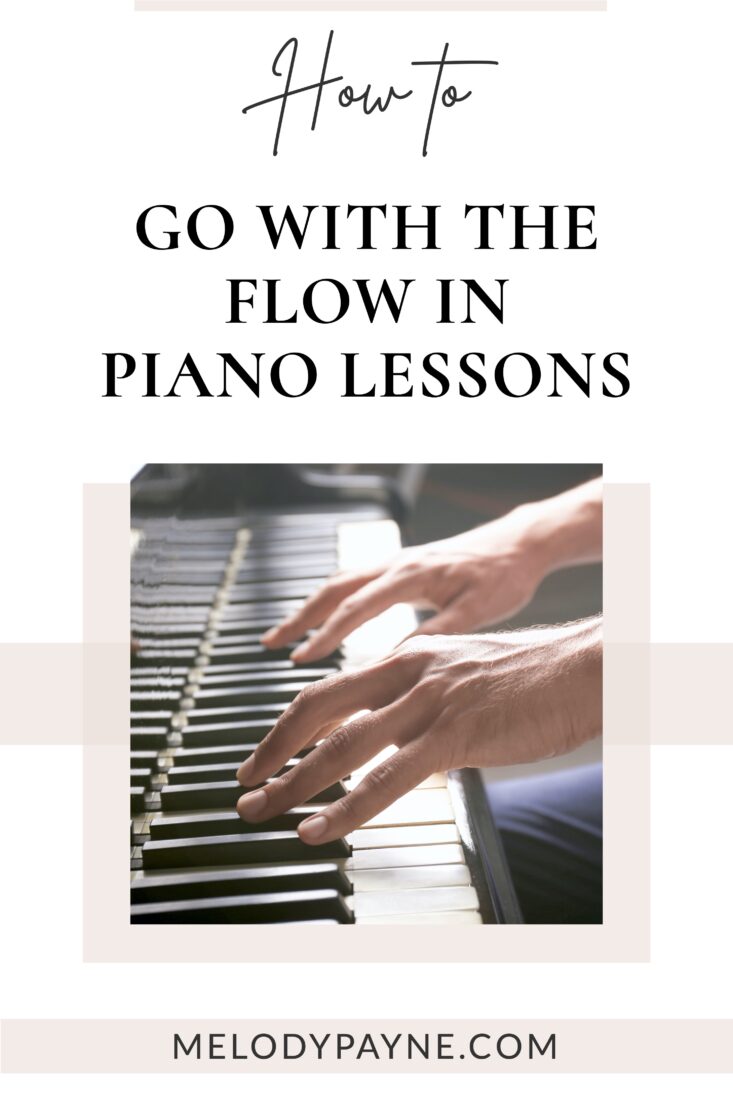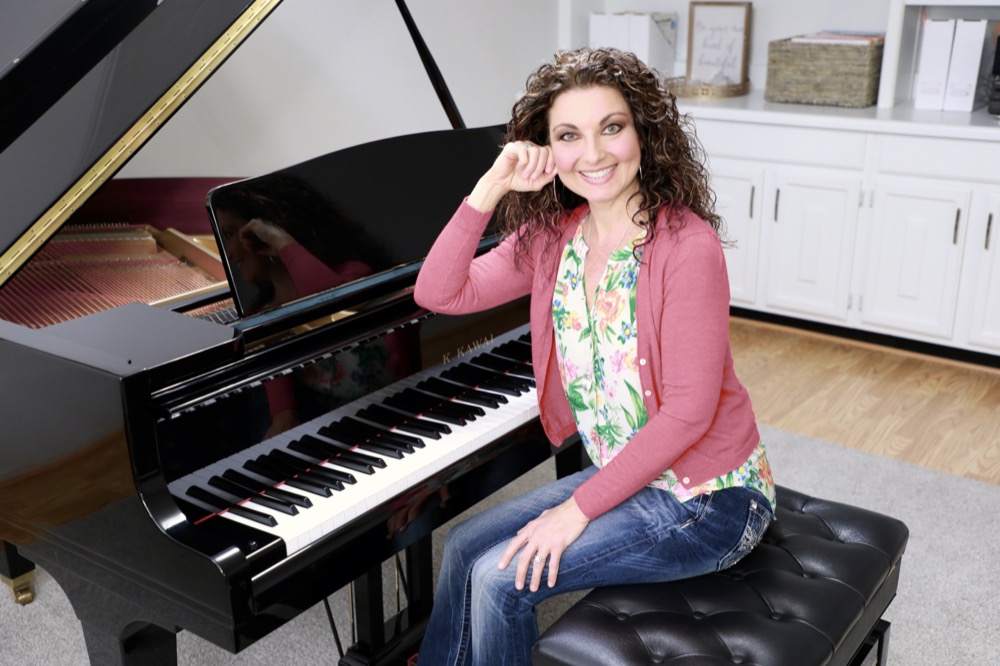How to Go with the Flow in Piano Lessons
This post may contain affiliate links. If you purchase something through an affiliate link, I will receive a small commission at no cost to you. For more information, read the disclosure statement here.

When students enter our studios, they usually arrive with some sort of baggage. Leftover and unprocessed feelings or emotions from the day, worries, stresses, fears. We often don’t see or hear about these issues, especially with students that are really good at “keeping it together”, but sometimes those feelings rear their heads during our weekly lessons with our students, causing a pause in our instructional time and begging for our attention.
Most of us have experienced lessons like this, especially those of us who have been teaching for a long time. Here’s a recent account of one of these experiences with one of my college students that I felt compelled to share with you: How we overcame the mental obstacles so he could perform beautifully, in spite of his anxiety.
THE BACKSTORY
This semester I am serving as sabbatical replacement for a local piano professor, who is away this semester studying mindfulness and self-compassion from a musician’s standpoint. Fascinating topic, and I’m excited to visit with her about it when her research is done! Interestingly, what you’re about to read in this post speaks directly to showing yourself compassion in piano lessons, and I hope you’ll enjoy it.
My responsibilities this semester include teaching four sections of class piano, preparing students for the piano proficiency exam, and teaching four private piano students. One of the private students who is not a music major is preparing for a senior piano recital at the end of the semester, so we have been working on his program and polishing the final details of the pieces to get them ready to perform in a few weeks.
Lessons from now until his recital are being held in the recital space – the beautiful chapel on campus – with it’s amazing acoustics and fabulous Steinway. It’s an incredible venue for a piano recital!
THE LESSON
When I arrived at the chapel for this particular lesson, he was already at the piano. We said hello, and I sensed immediately that he was experiencing a considerable amount of stress and anxiety, he was feeling incredibly tense, so tense he was freaking out about it, and he was exceptionally wound up. So much that I knew we were going to need to address it.
By nature, I’m a fixer and an encourager, so we got to work, trying to uncover the source of the stress that was visibly weighing on him so heavily. I could see the intensity of the stress written all over his face and in his body language. He was under a lot of distress, the anxiety was palpable, and I wanted to help.
We did some gentle arm stretches and chatted, in hopes he would begin to feel more calm and start to relax (if you need easy stretch ideas, check out Chest Stretches to Improve Piano Posture). He has had issues with tension in the past, and his previous professor had spoken with me about it before the semester began, so that I would have a bit of a “heads up” before meeting him, and so that I could continue the work of trying to help reduce the tension.
He asked if we could work on Mozart’s Fantasia in C Minor (K. 475) first because he had a lot of frustration and worry over the chromatic scale. He has been concerned about this scale for weeks, and he has been practicing and working on it in a variety of different ways. He was dispirited because he couldn’t play it as quickly and cleanly lately as he could two to three weeks ago, and he couldn’t figure out how to fix the problem.
My brain started firing tons of ideas, and within seconds I had a plan. I started asking him for some of the reasons he/college students/people in general might exhibit stress and tension. Here is a list of things he mentioned, as well as a few things I added to the conversation to broaden his awareness of where stress and tension can come from, in my own experience.
WHAT ARE SOME REASONS WE EXPERIENCE ANXIETY AND TENSION?
- Busy schedule with lots of responsibilities
- Projects he is working on for college courses
- Preparing for his upcoming senior recital
- Practicing on a daily basis
- Less than optimal piano posture (a little too low and a little too close earlier in the semester, but we’re working on it)
- Studying for midterms
- Not getting enough sleep
- Foods or drinks that support tension and anxiety (caffeine, sugar, food sensitivities)
- Interactions with or expectations of others
- Health issues (known or unknown)
- Weather (incoming storms or fronts, or seasons that cause physiological reactions in a person – headache, migraine, fatigue, winter blues, etc.)
- Unknown stressors
- Current mental state (ability to think clearly and execute a task cleanly at a given moment, or on a given day, or not)
After we talked through the reasons, I began to gravitate towards the topic that I sensed was at the root of today’s stress episode: He was working against his current mental state, expecting his brain to do things that it simply wasn’t able to do in that moment.
HOW DO WE CHANGE OUR MINDSET?
After realizing that we needed to address how our current mental state affects everything we do, I shared a personal story with him to illustrate that point, and now I want to share it with you. Many of you know that I have lived with and tirelessly fought Chronic Fatigue Syndrome for almost a decade.
A side effect of the chronic health issues is that the things going on in my body have compromised my ability to play certain passages of music in the same way I could play them before CFS – especially long fast passages or pieces – because my neurons don’t feel like they fire as rapidly as they did before CFS, and my thinking literally feels slower than it used to feel. Whaaaat? Yes. Think about that for a second. I’ll probably need two!
I’ve learned to accept that for the past several years, after going through a mourning period (and boy, did I mourn the loss of my former self and my former brain!), and because of that experience, I now gravitate towards slower and more lyrical piano pieces that I can play even more deeply, musically, and beautifully than ever, but that usually don’t have passages that cause my brain to come unglued because I just can’t process them like I used to.
I am able to enjoy the music immensely because I am working with what I have in any given moment, instead of against it. I am allowing myself grace. I am giving myself permission to play at the level that I am capable of in that moment. I’m not comparing my “today self” to my “pre-CFS self”. I am going with the flow.
I saw the lightbulb come on in his mind. The solution resonated strongly within him. He understood.
We chatted for a moment about accepting our current mental state, and working with what we are given in that moment in terms of how we feel and how we can perform. We chatted about making concessions based on our current state. He then performed the Mozart at a slower tempo, one that suited how he was feeling and what he was capable of in that moment. And it was magical.
Don’t try to work against your own body. Work WITH it. Go with the flow. And you’ll be so much happier with the results.
More blog posts on teaching & building student rapport
- 9 Essentials to Include in a First Piano Lesson
- Envisioning Lifetime Goals for Our Students’ Involvement in Music
- Building a Foundation of Mutual Trust in Piano Lessons
SaveSave
SaveSave
SaveSave
SaveSave
SaveSave
SaveSave
Don't miss out!
Follow on Facebook and Instagram, join the best Facebook group for piano teachers, and subscribe to the newsletter to get helpful teaching tips, resources, and tutorials delivered straight to your inbox every week.
Melody Payne
Melody Payne
Welcome!

Hi! I’m Melody Payne, a pianist and piano teacher, educational resource author, a fun-loving wife to the most wonderful and talented hubby I could ask for, and a lifelong learner who loves to share. I want to make your life as a music teacher easier by writing and sharing helpful and relevant music teaching articles, and by creating educational resources with your very own students in mind. If you are a parent who wants to enroll your child in piano lessons, I’d love for us to get started building those skills that can give your child a lifetime of musical enjoyment!


This Post Has 4 Comments
Thank you for your transparency Melody. I too deal with chronic health issues, and really lean in to the expressive playing, milking every last drop of emotion out of what I play, but not fast, as my fingers cannot begin to do what they did when I was in High School, in competitions. It is in accepting the new normal and capitalizing on my strengths that I can express myself. Because I have sleep apnea and fibromyalgia – I have “brain fog” which can prevent my mind from coming up with the words to express myself! playing the piano is an amazing way to express emotion when there aren’t words to do so!
Thank you so much for your comment, Tonya. I’m sorry to hear you are having health issues, but it sounds like you are doing a wonderful job of going with the flow! I completely understand the brain fog… Sometimes it feels like I can’t focus no matter what! Let’s keep hanging in there, and we can continue to use our own experiences to help our students with theirs. Wishing you all the best!
Hello Melody,
Thank you for sharing this post, it was very open and honest, not hiding your personal wounds.it was very strong.
it is definitely resonate to all us in different time of our life, and probably mentally already affecting us during this pandemic.
I am usually very uplifting person, but taking care of my mother ( we moved her to our house during this pandemic, and being together in household with college son( he is back home) , definitely adds a lot of anxiety.
I really need to learn how to deal with that.
Thank you again,
Marina
Hi Marina, I hope things will settle down soon, both with your anxiety and with the pandemic. I’m sure having so many family members to take care of can be difficult during this time. I’m trying to think lots of positive thoughts, and do the best I can each day to be the best teacher and wife I can be. Maybe things will get back to normal and anxiety levels will diminish for everyone.
Hang in there!
Melody